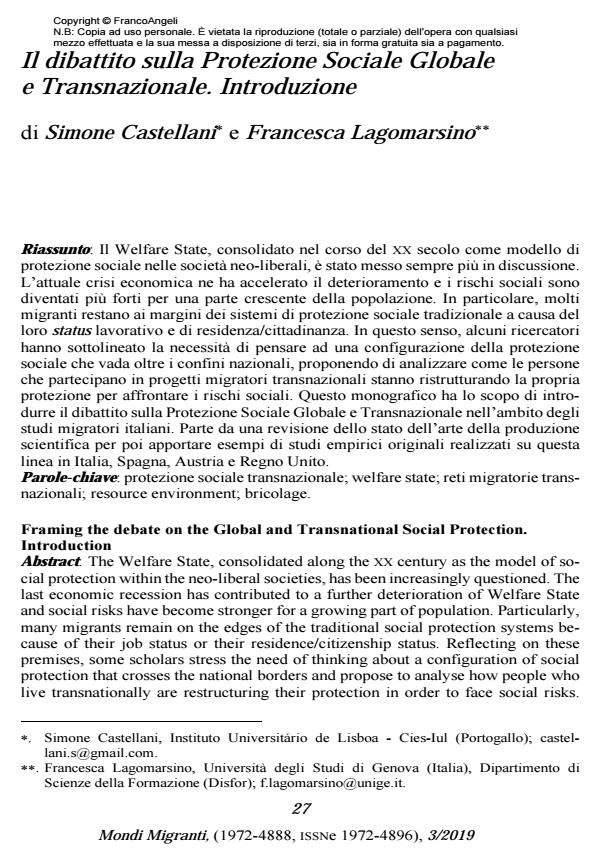Il dibattito sulla Protezione Sociale Globale e Transnazionale. Introduzione
Titolo Rivista MONDI MIGRANTI
Autori/Curatori Simone Castellani, Francesca Lagomarsino
Anno di pubblicazione 2019 Fascicolo 2019/3
Lingua Italiano Numero pagine 16 P. 27-42 Dimensione file 196 KB
DOI 10.3280/MM2019-003002
Il DOI è il codice a barre della proprietà intellettuale: per saperne di più
clicca qui
Qui sotto puoi vedere in anteprima la prima pagina di questo articolo.
Se questo articolo ti interessa, lo puoi acquistare (e scaricare in formato pdf) seguendo le facili indicazioni per acquistare il download credit. Acquista Download Credits per scaricare questo Articolo in formato PDF

FrancoAngeli è membro della Publishers International Linking Association, Inc (PILA), associazione indipendente e non profit per facilitare (attraverso i servizi tecnologici implementati da CrossRef.org) l’accesso degli studiosi ai contenuti digitali nelle pubblicazioni professionali e scientifiche.
Il Welfare State, consolidato nel corso del XX secolo come modello di protezione sociale nelle società neo-liberali, è stato messo sempre più in discussione. L’attuale crisi economica ne ha accelerato il deterioramento e i rischi sociali sono diventati più forti per una parte crescente della popolazione. In particolare, molti migranti restano ai margini dei sistemi di protezione sociale tradizionale a causa del loro status lavorativo e di residenza/cittadinanza. In questo senso, alcuni ricercatori hanno sottolineato la necessità di pensare ad una configurazione della protezione sociale che vada oltre i confini nazionali, proponendo di analizzare come le perso-ne che partecipano in progetti migratori transnazionali stanno ristrutturando la propria protezione per affrontare i rischi sociali. Questo monografico ha lo scopo di introdurre il dibattito sulla Protezione Sociale Globale e Transnazionale nell’ambito degli studi migratori italiani. Parte da una revisione dello stato dell’arte della produzione scientifica per poi apportare esempi di studi empirici originali rea-lizzati su questa linea in Italia, Spagna, Austria e Regno Unito.
Parole chiave:Protezione sociale transnazionale; welfare state; reti migratorie transnazionali; resource environment; bricolage.
Simone Castellani, Francesca Lagomarsino, Il dibattito sulla Protezione Sociale Globale e Transnazionale. Introduzione in "MONDI MIGRANTI" 3/2019, pp 27-42, DOI: 10.3280/MM2019-003002